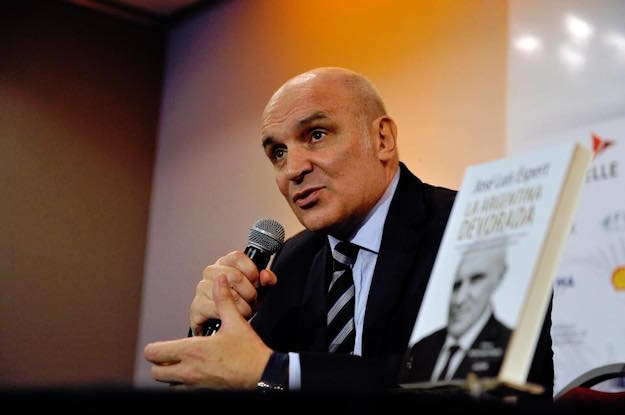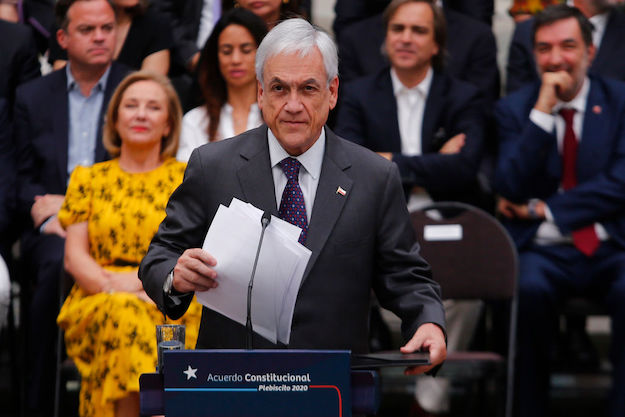Read more about Argentina’s upcoming elections
BUENOS AIRES – Argentine economist José Luis Espert once described President Mauricio Macri’s political movement as “kirchnerism with good manners,” a dig at a coalition whose very name – Cambiemos, or Let’s Change – sought to differentiate itself from Macri’s predecessors. Now a presidential candidate himself, Espert wants to make government a lot less polite.
“We need to lay off approximately 1.5 million public employees,” Espert, the head of the newly-formed Libertarian party, told AQ in an exclusive interview. “What I propose is a complete U-turn.”
The $57 billion stand-by agreement reached with the IMF last September – the largest loan in the history of the fund – has forced the Argentine government towards strict, orthodox economic policies, pushing Macri to end his “gradualism” approach and hit the gas on the road towards fiscal convergence. But Espert is proposing to take austerity even further.
An ever-present figure in the national media, Espert is looking to become the next political outsider to exploit the anti-establishment wave that has realigned Latin American governments. As Argentina’s conservative voters become increasingly disillusioned with the Macri administration’s handling of the economy, Espert hopes his unapologetic orthodoxy may resonate among them.
The economist claims that he is the only candidate who can actually turn around what he describes as “Argentina’s century-long failure, marked by economic populism.”
Identifying Chilean President Sebastián Piñera as a regional role model – “not only because of his ideas, but the way in which he implements them too” – Espert explained to AQ that, like Chile and Peru, Argentina “needs to change its entire production system, but not in the way its business leaders want.”
“We need to abandon our model of import substitution and of running budget deficits, and revise our labor laws, which are similar to those during Italian fascism. We need to have free trade and a state that can pay for itself through reasonable taxes,” added Espert, who on Feb. 2 released a book called The Complicit Society, in which he describes “the economic myths that led Argentina to decadency.”
But, as far as Espert is concerned, the current administration will never be the one to deliver the changes he is looking for.
“They attack me for being the messenger, but in economics, the numbers speak for themselves. We are ending Macri’s term worse off than we began,” Espert argued.
Espert’s claims about Macri and Cristina Fernández de Kirchner’s similarities helped plant the seed for what has become his presidential run. In Feb. 2018, Espert published an op-ed in La Nación entitled “Macri in Wonderland,” which criticized the government for failing to implement the structural reforms needed to achieve sustained economic growth.
“Rather than fixing them, it seems like Cambiemos is comfortable with keeping – even deepening – the imbalances inherited from the Kirchner administrations while they can. And if international interest rates increase and make the project more difficult, either God will provide, or they will know who to blame for the economy’s complications,” the piece read.
The article went viral, prompting Cambiemos to take up the gauntlet, Treasury Secretary Rodrigo Pena retaliated with his own op-ed.
“Like in football games, in the economic landscape there are spectators who specialize in providing magical solutions,” Pena wrote. “It is one thing to criticize loosely from the bleachers, but it is another to have the responsibility of actually governing a country of millions of Argentines.”
Rather ironically, albeit likely involuntarily, Pena’s accusation bore a striking resemblance to a 2011 statement by then-president Cristina Fernández de Kirchner. She famously taunted her detractors by saying that if they wanted to change the country’s economic model, they should “organize a political party and win the elections.” Kirchner’s advice was duly noted – and Cambiemos was born.
Fittingly, Pena’s chiding acted as a similar call to arms seven years on: Sure enough, ten months after their media rift, Espert’s candidacy is in full swing.
Although the grassroots structure of his Libertarian Party pales in comparison with those of more competitive counterparts, Espert does have a couple of tricks up his sleeve to ensure that his message is heard by the masses. Not only is he one of the media’s go-to economists, but many of his high-profile colleagues have expressed their support for him.
Most significantly, Javier Milei, Fausto Spotorno and Guillermo Nielsen all offered him their endorsement, attending the launch of his candidacy. Each are among Argentina’s most interviewed economists, and their combined advocacy of Espert’s ideologies on Argentina’s most influential media platforms will be invaluable to his campaign.
But Espert knows he must look for support further afield too. While he refused to disclose whether he would seek Brazilian President Jair Bolsonaro’s support, the economist told AQ that he intended to open a dialogue with his powerful economy minister, Paulo Guedes, praising his similarly orthodox views. Referring to Guedes’s plans to implement business-friendly policies, Espert insisted that if Argentina fails to do the same, the country “will be in an even worse position than we already are.”
Espert himself knows that his chances of coming close to winning the election are slim. Even so, the economist could still find cause to celebrate come October by achieving two more feasible goals.
On the one hand, a particularly strong performance in the first round – and perhaps winning a seat or two in the Lower House – could help to continue building the foundations of a movement that in the medium-term could compete for the presidency. With this clearly in mind, Espert urged conservative voters to set aside their fears of a return of kirchnerism in a tweet in January. “We will get rid of these crazy [kirchnerists] in the runoff. In the primaries and the first round, let’s vote for something better than kirchnerism and better than Macri’s mediocrity. Let’s vote for common sense.”
On the other hand, the threat of Espert’s candidacy may pressure Cambiemos into shifting its policies further to the right to avoid losing votes from disillusioned conservatives in the first round. The economist would at least be able to see some of his ideas come to life, albeit not by his own hand. In what could one day turn out to be a Kirchner-Pena-style premonition, a December tweet from Espert reads: “Instead of complaining about the votes I will hypothetically take from them, Cambiemos could win them back by reducing public spending and lowering taxes. Just do it, don’t cry about it.”
—
Bio is a journalist in Buenos Aires






